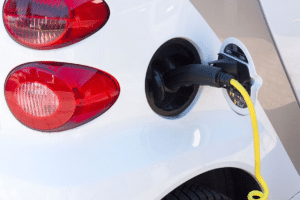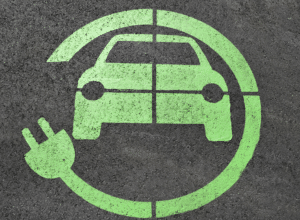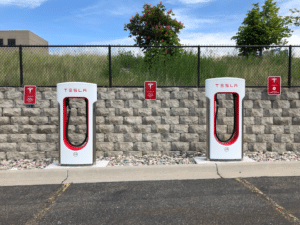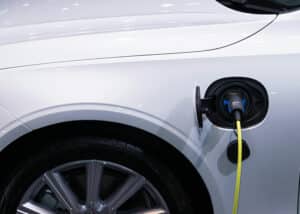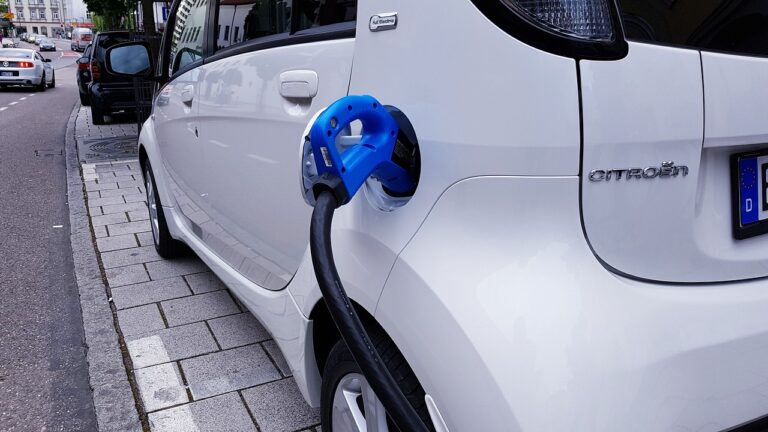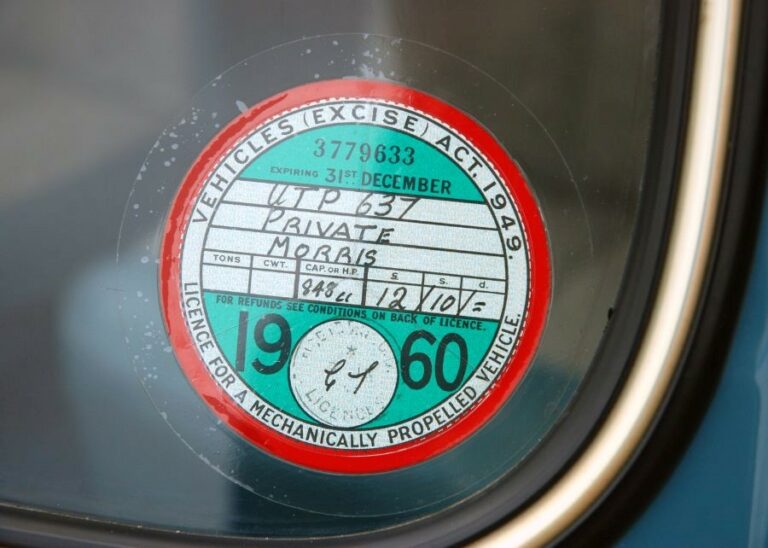According to Driving Electric, there are currently 11 UK hydrogen fuel stations, with 6 of them being open to the public. Located in the southeast of England most of them, you can find a map and a list of the hydrogen fuel stations can be found here.
What are hydrogen fuel stations designed for? Find out everything you need to know here.

Hydrogen Fuel-Cell Vehicles: Everything You Need to Know
Hydrogen fuel stations are designed to provide a fast and convenient way to refuel hydrogen fuel-cell vehicles, which are an alternative to battery-electric vehicles. Hydrogen fuel-cell vehicles have some advantages over a battery electric car, such as longer range, quicker refuelling time, and zero tailpipe emissions, says Driving Electric. However, there are also some challenges, such as the high cost of hydrogen production, distribution, and storage, the limited availability of hydrogen fuel stations, and the low number of hydrogen fuel-cell vehicles on the market.
How a hydrogen fuel cell car works
Hydrogen fuel cell cars are essentially fuel cell electric vehicles, a type of vehicle that uses hydrogen and oxygen from the air to generate electricity in a fuel cell stack. With fuel cell electric vehicles, the electricity powers an electric motor that turns the wheels and the only byproduct of the hydrogen power process is water and heat says the Environmental Protection Agency.
There are two ways that hydrogen can be used to fuel cars: through hydrogen fuel cells or through hydrogen combustion. Hydrogen fuel cells work by performing reverse electrolysis, a chemical reaction that extracts electrons from hydrogen and combines hydrogen protons with oxygen. According to Car Magazine, hydrogen combustion works by directly injecting pressurised hydrogen gas into an engine’s combustion chamber and burning it like petrol or diesel.
Hydrogen fuel cell cars have some benefits over conventional cars, such as producing no exhaust emissions apart from water, accelerating faster, and having a longer driving range, says Alternative Fuel Data Center. However, they also face some challenges, such as the high cost of production, the limited availability of hydrogen refueling stations, and the efficiency of hydrogen generation, according to CSIRO.

Is Hydrogen fuel inefficient, or ‘dirty’?
Hydrogen fuel cars and hydrogen powered vehicle can be efficient and clean, depending on how the hydrogen is produced and used. There are different types of hydrogen fuel cars, such as fuel cell electric vehicles (FCEVs), dual fuel internal combustion engine vehicles (ICEVs), and hydrogen internal combustion engine vehicles (H2-ICEVs), each with their own advantages and disadvantages in terms of greenhouse gas emissions and energy efficiency.
According to a study by Zemo Partnership, hydrogen fuel cars can deliver low or even negative GHG emissions if they use low carbon hydrogen, which is hydrogen produced from renewable sources or with carbon capture and storage (CCS). However, if they use fossil hydrogen, which is hydrogen produced from natural gas or coal without CCS, they can have higher GHG emissions than diesel ICEVs.
The same study also found that hydrogen fuel cars have lower energy efficiency than diesel ICEVs, battery electric vehicles (BEVs), and ICEVs using renewable fuels. This is because the production of hydrogen from electricity is energy intensive and involves conversion losses, says Zemo. For example, FCEV trucks are about four to six times less energy efficient than BEV trucks on a well-to-wheel basis.
Is Hydrogen Fuel a Renewable Energy?
Yes, hydrogen fuel is considered a renewable energy source. It can be produced using a variety of methods, including electrolysis, which involves splitting water molecules into hydrogen and oxygen using electricity. This electricity can be generated from renewable sources such as solar, wind, or hydro power, making the process of producing hydrogen fuel carbon-free. Additionally, hydrogen can also be produced from biomass through a process called gasification. The use of hydrogen as a fuel produces zero greenhouse gas emissions, as its combustion only results in the production of water vapour. This makes hydrogen fuel a sustainable and environmentally friendly energy option for various applications, including transportation and electricity generation.
How much do hydrogen cars cost – and why?
The cost of a hydrogen car depends on several factors, such as the model, the market, and the fuel price. For example, according to Scotsman, the only two hydrogen fuel-cell vehicles for sale in the UK, are the Hyundai Nexo, which is £69,495 and the previous generation Toyota Mirai costing around £65,000 in the UK. The current price for filling up is between £10 and £15 per kg of hydrogen, which means a 100 km journey in the Hyundai Nexo would cost around £11.40, says AutoTrader. In comparison, a diesel car would cost around £5.81 and a petrol car would cost around £7.11 for the same distance.
According to Driving Electric, the cost of refuelling a hydrogen fuel-cell vehicle varies depending on the location and the operator of the station, but it is generally higher than the cost of charging a battery-electric vehicle. To use a hydrogen fuel station, you need to download an app and create an account with the operator, scan a QR code on the charge post, plug in your hydrogen vehicle in, and start refuelling, says Driving Electric. You can also monitor your refuelling session and pay for the service through the app.
The high cost of hydrogen vehicles is partly due to the expensive and complex technology involved in producing and storing hydrogen, as well as the low demand and supply of the vehicles and the fuel. Most of the hydrogen production still uses natural gas, which is not very eco-friendly, says the RAC. However, there are efforts to produce low-carbon or green hydrogen from renewable sources or with carbon capture and storage, according to the Scotsman.

Hydrogen Fueling Stations
Hydrogen fuel stations allow you to fill up your hydrogen car with hydrogen gas stored in hydrogen tanks. Hydrogen powered vehicles have some advantages over conventional passenger cars, says glpautogas.info, such as zero tailpipe emissions, fast refueling, and long driving range.
However, there are not many hydrogen fueling stations in the UK at the moment. According to Driving Electric, there are currently only six hydrogen fueling stations open in the UK that you can use to fill up a hydrogen fuel cell car. Three of them are located within the M25, one in the Peak District, and two in Scotland, with plans for three more hydrogen filling stations too, one in Belfast, another in Glasgow, and finally one at Cavendish House in Stockton-on-Tees.
The Future of Hydrogen Cars
Who knows exactly what the future will hold for hydrogen cars. The fuel cell electric vehicle is on the UK government’s agenda as they have announced plans to invest in the development of the hydrogen sector and to move away from fossil-based hydrogen production, says the RAC. This could help reduce the cost and environmental impact of hydrogen cars in the future.
However, there are still many challenges to overcome, such as increasing the number of refuelling stations, improving the energy efficiency of hydrogen production and use, and competing with other technologies such as battery electric cars. According to Car Magazine, hydrogen cars may not replace electric cars, but they could complement them in a multi-fuel future.
How many hydrogen fuel stations are in the UK?
At the time of writing this article, there are currently 11 hydrogen fuelling stations in the UK, however only 6 of those are open to the public.
Hydrogen fuel stations, also known as hydrogen refuelling stations or HRS, are essential infrastructure for the development and adoption of hydrogen-powered vehicles. The UK government has been actively supporting the expansion of hydrogen fuel stations as part of its efforts to decarbonize the transportation sector. Currently, the 11 hydrogen fuel stations in the UK are strategically located to provide coverage across key regions, including London, Birmingham, and Swindon. These stations offer a means for hydrogen-powered cars, buses, and other vehicles to refuel and extend their range. The government aims to further expand the network of hydrogen fuel stations to accelerate the growth of hydrogen fuel cell vehicles in the country. This infrastructure development is crucial to promote the use of zero-emission vehicles and reduce greenhouse gas emissions in the transportation sector.
How much does a gallon of hydrogen fuel cost in UK?
The price of hydrogen fuel in the UK can vary depending on the source and location. The average cost per kilogram of hydrogen, which is equivalent to a gallon, ranges between £10-£15. However, it is important to note that the actual cost can differ due to factors such as production methods, distribution, and availability. Additionally, the price may also vary based on the specific hydrogen fuel station or provider. The cost of hydrogen fuel is influenced by various factors such as infrastructure development, production efficiency, and economies of scale. As the hydrogen industry continues to develop and expand, it is expected that hydrogen costs will decrease, making it a more competitive alternative to traditional fossil fuels.
What are 3 disadvantages of hydrogen fuel?
1. Limited Infrastructure: One major disadvantage of hydrogen fuel is the lack of infrastructure for its production, storage, and distribution. The existing infrastructure for hydrogen fuel is minimal compared to traditional gasoline or electric charging stations. Building a widespread hydrogen fuel infrastructure would require significant investment and time, making it a less viable option for widespread adoption in the near future.
2. Cost: Another drawback of hydrogen fuel is the high cost associated with its production. The current methods of producing hydrogen, such as steam methane reforming or electrolysis, are energy-intensive and require expensive equipment. Additionally, the transportation and storage of hydrogen can also be costly due to the need for high-pressure tanks or cryogenic storage systems. These high production and infrastructure costs make hydrogen fuel less economically viable compared to other alternatives.
3. Safety Concerns: Hydrogen is highly flammable and can pose safety risks if not handled properly. While hydrogen has a high energy content, its low density makes it more prone to leakage. The storage and transportation of hydrogen require specialized equipment and safety measures to prevent accidents or explosions. Addressing safety concerns and ensuring proper handling of hydrogen in fuel cell technology can be challenging and may deter its widespread adoption.
In conclusion, despite the potential of hydrogen fuel as a clean and renewable energy source, there are several disadvantages of hydrogen technology that hinder its widespread adoption. These include the limited infrastructure, high production costs, and safety concerns associated with hydrogen fuel. Overcoming these challenges will require significant investment, research, and development to make hydrogen fuel a more viable and accessible alternative to conventional energy sources.
What are 3 advantages of hydrogen fuel?
1. Environmental benefits: Hydrogen fuel is considered a clean energy source as it produces zero greenhouse gas emissions when used in fuel cells. When hydrogen is burned, it combines with oxygen to produce water vapor as the only byproduct, without carbon emissions, making it an attractive alternative to fossil fuels that contribute to global warming and air pollution.
2. Energy efficiency: Hydrogen has a high energy-to-weight ratio, meaning it contains a large amount of energy when compared to its weight. This makes it a highly efficient fuel source, as it can provide more energy per unit of weight than traditional fossil fuels. Additionally, hydrogen fuel cells have higher energy conversion efficiency compared to internal combustion engines, allowing for more efficient utilization of the energy stored in the hydrogen.
3. Versatility and storage: Hydrogen can be produced from a variety of renewable and non-renewable sources, including water, natural gas, biomass, and even excess electricity from renewable energy sources. This versatility of hydrogen technologies enables the production of hydrogen fuel through various methods, ensuring a diverse and flexible energy supply. Furthermore, hydrogen can be stored in different forms, such as compressed gas or liquid form, and its energy can be easily transported and utilized in different sectors, including transportation, power generation, and industrial applications.
In addition to these advantages, hydrogen fuel also offers potential economic benefits. As the world seeks to transition to a low-carbon economy, investing in hydrogen infrastructure and technologies can create new job opportunities and stimulate economic growth. Moreover, hydrogen fuel cells can provide a reliable and continuous source of power, reducing dependence on fluctuating energy sources like wind or solar power. This stability can be particularly valuable in sectors that require a constant and uninterrupted supply of electrical energy, such as hospitals, data centres, or telecommunications. Overall, the advantages of hydrogen fuel make it a promising and versatile option in the pursuit of sustainable energy solutions.
Can I run a petrol car on hydrogen?
No, you cannot directly run a petrol car on hydrogen. Petrol engines are designed to combust petrol fuel, and hydrogen requires a different type of engine called a hydrogen fuel cell. Hydrogen fuel cells generate electricity through an electrochemical reaction between hydrogen and oxygen, which then powers an electric motor. This is a completely different technology from the internal combustion engine used in petrol cars. However, it is possible to convert a petrol car into a hydrogen fuel cell vehicle through retrofitting, but it would involve significant modifications to the engine and fuel system.



















